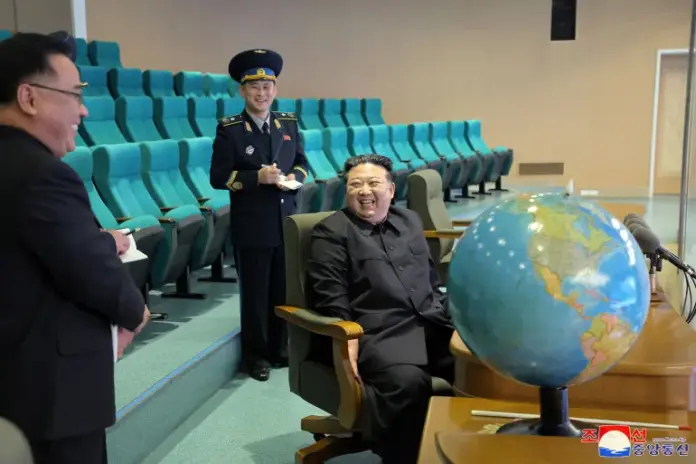A calculated posture amid a shifting global order
North Korean leader Kim Jong-un, via the state-run KCNA news agency, issued a carefully phrased olive branch to Washington on Monday: Pyongyang is open to resuming contact with the United States—but only if Washington abandons what he called its “delusional obsession with denuclearisation.” In other words, the bomb is non-negotiable. The Kim Jong-un United States keyphrase is at the heart of this long-frozen geopolitical standoff, which may now be entering a phase of strategic realignment.
Kim isn’t just reaching out; he’s redefining the terms of engagement. And this shift is no accident. It comes at a moment when the White House, under the re-elected Donald Trump, is searching for diplomatic traction in an increasingly unstable Indo-Pacific region. China’s assertiveness, South Korea’s political fragility, and Washington’s diminishing credibility have all opened a strategic window for Pyongyang to seize the initiative.
“I have fond memories of Trump”: a coded message
Kim, ever the tactician of a besieged but never isolated regime, pointedly mentioned his “personal fondness” for Donald Trump. More than mere sentiment, this is a signal—a return to a form of personalist diplomacy where strongman egos outweigh institutional processes. North Korea’s gamble is clear: if Trump was willing to engage without preconditions in 2018, why not again in 2025?
The idea that Trump could re-engage with Pyongyang without demanding immediate denuclearisation is not far-fetched. He has repeatedly called Kim a “smart guy,” and his circle has been leaking deliberately ambiguous signals about a possible new round of diplomacy—less moralistic, more transactional. In Trump’s world, North Korea’s nuclear arsenal might be viewed as a bargaining chip, not a deal-breaker.
The nuclear program: a non-negotiable red line
North Korea has never concealed its intentions. Since 2006, it has conducted six nuclear tests, continued expanding its ballistic capabilities, and built its strategic doctrine on asymmetrical deterrence. In January, Kim reaffirmed that the nuclear program would continue “indefinitely.”
Pyongyang’s condition is far from rhetorical—it marks a paradigm shift. It demands that the U.S. treat North Korea as a de facto nuclear power, and drop the pretense of disarmament. This confronts the American position head-on, still clinging to the illusion of total denuclearisation. The Kim Jong-un United States standoff is now less about diplomacy and more about power recognition.
A disrupted regional order
The Indo-Pacific, once stabilized under the American military umbrella, is fragmenting into silos of mutual distrust. South Korea, politically weakened, lacks a coherent strategic line. Japan, cautious but uneasy, continues to expand its defensive posture. China watches silently, ready to benefit from a weakening American hand.
In this shifting theatre, Pyongyang is playing a bold card: the nuclear pariah as diplomatic kingmaker. By refusing to even discuss denuclearisation, Kim forces Washington into a brutal dilemma: ignore him at the risk of escalation, or acknowledge him as a nuclear actor—without officially saying so.
Dialogue or silent recognition?
Behind the polite façade of “conditional diplomacy,” the United States now faces a stark choice: pretend to believe in denuclearisation, or accept the hard reality of a nuclear-armed North Korea and talk anyway. The potential renewal of contact between Kim Jong-un and the United States is not a normal diplomatic overture—it’s a test of strategic maturity.
Trump may—whether out of instinct or opportunism—cross the Rubicon. It wouldn’t be the first time Washington has sat down with those it once branded as untouchable. But at what cost?



